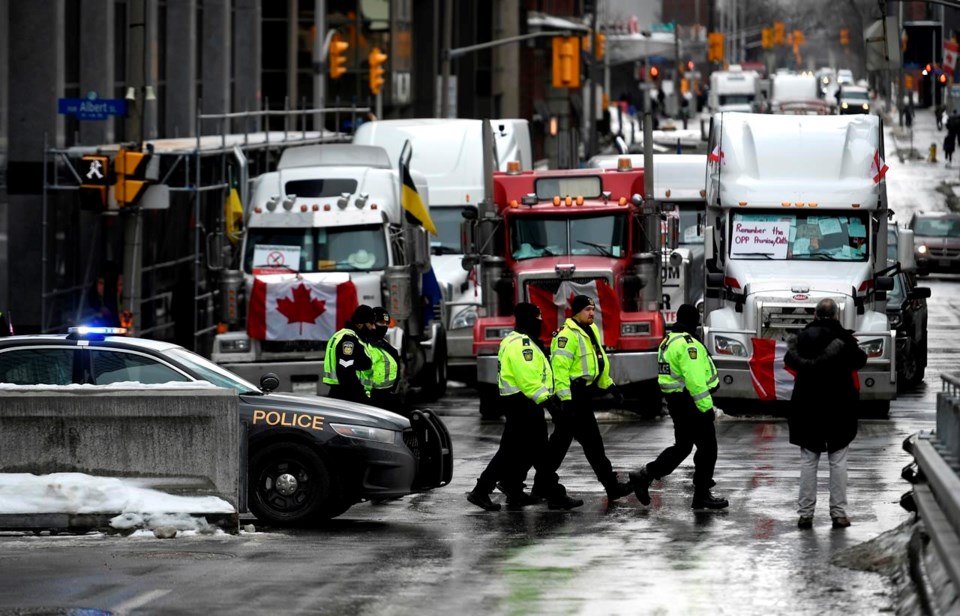OTTAWA — The federal government lacked the evidence to determine protests and barricades across Canada last year were threats to national security, an organization that defends constitutional rights told a federal judge Tuesday.
Sujit Choudhry, counsel for the Canadian Constitution Foundation, said the Liberal government needed more supporting information to make that finding in mid-February 2022.
"Cabinet's determination that the protests and blockades were threats to the security of Canada was unreasonable, because it had insufficient evidence to reach that conclusion," Choudhry said during the second day of a Federal Court review.
Justice Richard Mosley is hearing concerns from several groups and individuals about the government's use of the Emergencies Act to quell "Freedom Convoy" actions that paralyzed downtown Ottawa and blocked key border points.
The Public Order Emergency Commission, a mandatory review that takes place after invocation of the emergencies statute, recently found the government met the very high threshold for using the law.
Legal arguments about the historic decision are now being weighed by a court of law.
In early February 2022, downtown Ottawa was besieged by protesters, many in large trucks that arrived beginning in late January. Initially billed as a demonstration against COVID-19 health restrictions, the gathering attracted people with various grievances against Prime Minister Justin Trudeau and his government.
Meanwhile, the protests spread and trucks clogged border crossings, including key routes to the United States at Windsor, Ont., and Coutts, Alta.
On Feb. 14, the government invoked the Emergencies Act, which allowed for temporary measures including regulation and prohibition of public assemblies, the designation of secure places, direction to banks to freeze assets and a ban on support for participants.
It was the first time the law had been used since it replaced the War Measures Act in 1988.
Choudhry said Tuesday the government resorted to the law even though the Canadian Security Intelligence Service had assessed that the protests did not amount to a threat to the security of Canada as defined by the CSIS Act.
Federal lawyers say in a written submission to the court that the government had reasonable grounds to believe this threshold was met for the purposes of the Emergencies Act, "based on all of the inputs available to it at the time. It was equally reasonable for CSIS to reach a different conclusion for the purposes of its own mandate."
Much like the government was not bound by CSIS’s assessment of threat under its own legislation, it was also not obliged to wait for an additional assessment requested by national security adviser Jody Thomas just before noon on Feb. 14, the federal submission says.
It also stresses that the assessment Thomas ordered was not intended to be an alternative document, but rather a collation of existing information, including some points that had been made verbally but not written down.
Given the "urgency of the situation, however, there was nothing unreasonable" in the government deciding to act without waiting for this additional written compilation, the federal filing says.
Choudhry said the pending threat assessment "wasn't just nice to have, but was legally required" in the face of the CSIS assessment that there was no threat to the security of Canada.
That prompted Mosley to ask: "Is there a particular magic to the threat assessment?"
The judge said the government had other sources of information, and while another risk assessment "would have been perhaps sensible," he questioned whether it was required by law.
"Your honour, we think it's required by the law," replied Choudhry.
On Monday, the Canadian Civil Liberties Association said the government did not clearly spell out proper legal justification for its use of the emergency measures.
The court is also hearing from counsel for others who filed actions contesting use of the emergency measures: Canadian Frontline Nurses and Kristen Nagle, and individuals Jeremiah Jost, Edward Cornell, Vincent Gircys and Harold Ristau.
Overall, the government argues the extraordinary steps to deal with the emergency situation were targeted, proportional, time-limited and compliant with the Charter of Rights and Freedoms.
Federal lawyer Christopher Rupar said Tuesday the court had heard much hindsight about what could have been done differently on Feb. 14 of last year.
"That's not how this matter should be reviewed," Rupar said. "This matter should be reviewed based on the context of what happened that day and the days leading up to it, and what the decision-making process was looking at."
The three-day hearing is slated to conclude on Wednesday with additional arguments from federal lawyers and statements in reply.
This report by The Canadian Press was first published April 4, 2023.
Jim Bronskill, The Canadian Press


